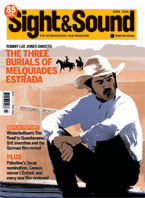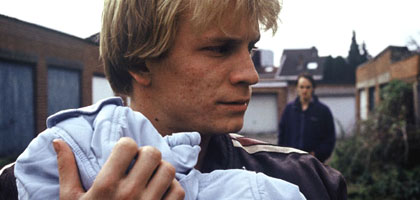
Weight Of Water

Award-winning films such as L'Enfant have the Dardenne brothers pegged as grim realists but the painstaking pair do far more than simply shoot what's there. By Jonathan Romney
At Cannes last year Belgian film-makers Jean-Pierre and Luc Dardenne won their second Palme d'Or with L'Enfant (The Child), only six years after the award had gone to their film Rosetta. The scrupulously unglamorous, unsentimental story of a teenage girl and her survival strategies, Rosetta was a questionable choice for some commentators, its reduced canvas and minor key at odds with the expectation that a Palme d'Or winner should be a grand statement or a work self-consciously determined to change the course of film history.
For other viewers, however, Rosetta's triumph was a heartening vote for economical, hands-on film-making of acute observational intelligence. The Dardennes' follow-up Le Fils (2002) was conceived on a still-tighter, even minimalist scale: its camerawork hung so closely on the shoulders of actor Olivier Gourmet that the audience could almost count the hairs on his beefy neck. Some saw Le Fils as a veiled religious parable of redemption. Olivier, a carpentry teacher, takes on a teenage pupil: the boy who killed his son. The story ends with conflict followed, it's implied, by forgiveness, and given the detailed attention to Olivier's craft - the grain and heft of timber, the arduous work of cutting and carrying planks - some read Le Fils as expressly Christian.
Equally, though, one might consider Le Fils the most precise docu-drama ever made about the business of carpentry. What renders the Dardennes' films special is that they are remarkably specific about specifics. Things, people, places, types of work are observed at extremely close quarters, and beyond what we see (or what is implied, for sometimes only a doorframe is required to suggest an entire room) nothing more need be said.
The same scrupulous economy is visible in L'Enfant, once again set in the Belgian industrial town of Seraing, near the Dardennes' base in Liège. Originally inspired by the sight of a young girl aimlessly wheeling a pram, L'Enfant begins with teenage mother Sonia, played by newcomer Déborah François, going in search of 20-year-old Bruno, the father of her newborn baby Jimmy. When Bruno eventually turns up (played by Jérémie Renier, who starred in the brothers' 1996 film La Promesse), he's too engrossed in one of his small-time scams to take much interest in his son. We soon realise that Bruno is a child himself: unable to comprehend ideas of adult relationships and fatherhood, he blithely squanders whatever he can hustle.
Then he commits an act all the more shocking for the gauche matter-of-factness with which he does it: he decides to sell his baby for adoption. In a nerve-racking sequence he delivers little Jimmy to a flat, waiting in another room while unseen figures swap the child for an envelope of banknotes - one discreetly wrapped bundle for another. Daringly, the film refuses to exploit this plot point in a standard fashion: very soon after, Bruno retrieves the goods and Jimmy is returned to his mother. Sonia sends her lover packing, having fainted when he coolly reassures her, "We'll have another", and the rest of the film shows Bruno crashing to earth from his fantasy world of weightless love and fast money after a grilling by a policeman (the briefest cameo for Olivier Gourmet) and a beating by the traffickers, to whom he is now in debt. At last Bruno has to take responsibility for himself after nearly causing the death, in the muddy river Meuse, of Steve, his teenage accomplice in petty theft.
The film ends with a reconciliation scene that will inevitably raise comparisons with Bresson's Pickpocket, as Rosetta did with Mouchette. But while the conclusion is emotionally satisfying, it's hardly neat, with several questions unresolved. Will the couple learn to live together as adults? How will Bruno deal with his debt? And what kind of life is in store for the hapless Jimmy?
What makes the Dardennes' realism so extraordinary is the concreteness with which the brothers define their territory. Much has been written about how they have turned the dingy and unpromising Seraing into a microcosmos: they shot several documentaries there in the 1970s and 1980s and have made the town their entire fictional universe since their second fiction feature Je pense à vous (1992). What emerges from the interview below is just how important it is for the Dardennes to know their locations intimately, down to individual rooms.
It's also apparent that, although their films use the concrete material that's to hand, the Dardennes don't leave anything to chance. Their anecdotes below make clear that in their films things don't just happen; rather, the Dardennes take circumstance and integrate it into the shape of their fiction. Theirs is a realism that's neither caught on the fly nor the product of detached artifice, but one that's painstakingly sought out by the brothers - detectives nosing out the dramatic essentials in an apparently nondescript world.
